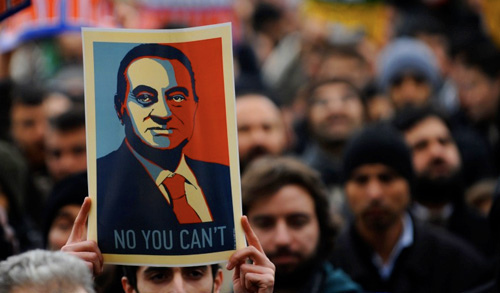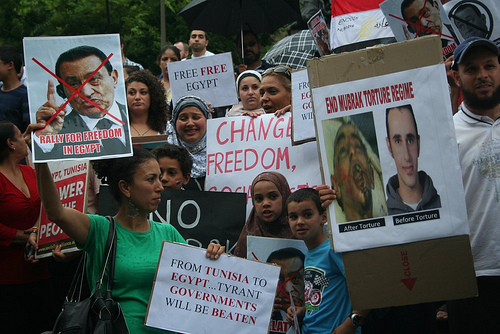Consensual sex remains a taboo topic in today’s Middle East, needless to mention rape. Religion plays a central role in the societies and legal systems of the region, so the issue of rape is seldom discussed. Countless victims live in secrecy, without ever seeing their attackers brought to justice, because of an inbuilt fear of being judged or socially shunned. This was not the case for Iman Al-Obeidi, the lawyer who ran into a room full of foreign journalists in Libya and announced she had been gang raped by 15 of Gaddafi’s men.
It’s barely been a day since the dramatic scene of Iman being muffled, restrained and driven away, but the Libyan government has already started a campaign to smear her character. Iman is now being referred to as a prostitute on Libya’s state TV, one whose own sister appearing to testify against her character (under obvious coercion). This perfectly demonstrates the stalemate that Arab society finds itself in; being caught in the rigid dichotomy between the true teachings of religion and how it’s been practiced.
Aside from Iman, whose revelation served a higher political purpose, most women live in silence. However, been a number of instances in which victims of rape in the Middle East have spoken out – if not to seek closure for themselves, to raise awareness on the matter. From Iran to Saudi and Lebanon, the laws that exist to deter men from committing rape are flimsy or not enforced. There’s no official statistics on rape in any of the countries of the Middle East for two reasons:
1. Not many people report being raped – either out of fear of social repercussions (difficulty getting married or “tarnishing” the family name) or out of the simple sense of shame with the fear they won’t be believed.
2. The Arab governments secretly like to sweep ‘dishonorable’ or ‘shameful’ matters under the rug.
Israeli poet and writer Yvette Nahmia-Messinas acknowledged the problem of rape in the region in an article entitled “Middle East’s Paradigm Shift: Rape is No Longer Accepted Here”, urging the “women and men of the Middle East [to] condemn the rape of [y]our bodies, the rape of [y]our dignity and freedoms”.
Flawed laws on rape in the region:
Iran: One of Iran’s Imams was quoted stating that rape was permissible under the laws of Islamic Shari’a in certain instances. It must be stated that Mesbah Yazdi is a controversial Cleric who by no means speaks in the name of Islam as a religion, but is the religious mouthpiece of Ahmadinejad’s oppressive regime. Here are some of the disgustingly shocking things he said:
Q:Can interrogator rape the prisoner in order to obtain confession?
A: The necessary caution is for the interrogator to perform the ‘Vozoo’ (ablution: the act of cleansing mandated by Islam before praying) first and say prayers while raping the prisoner.If the prisoner is female, it is OK to rape through vagina or anus. It is better not to have a witness present. If it is a male prisoner, then it’s OK for someone else to watch while the rape is committed.
Q: Is raping of men and young boys considered sodomy?
A: No, because it is not consensual. Of course, if the prisoner is aroused and enjoys the rape, then caution must be taken not to repeat the rape
Lebanon: Lebanon’s laws on rape give men one message: if you want to marry a girl who doesn’t want you, you can just rape her. “One of the absurd laws on the books allows a rapist to be exempt from prison if he marries his victim,” said Ezzat Mroue, vice-president of the Women’s Rights Committee (WRC).
Rape is far from the Middle East’s last taboo, but it is definitely one of the most secretive and destructive ones. It baffles me as to how a society like Lebanon’s can be so liberal and moderate but at the same have laws pertaining to women, which are nothing less than barbaric. Or even worse, how a country like Iran can preach religion and holiness and at the same time justify the act of rape – for any reason.








